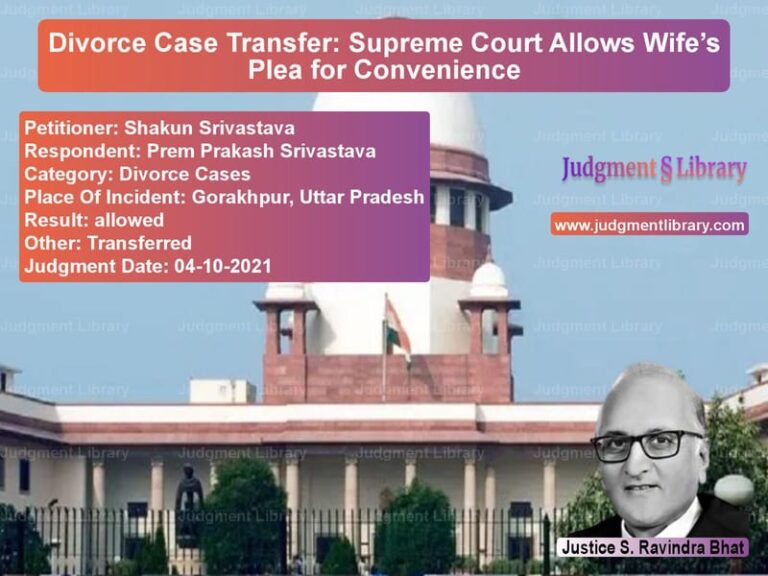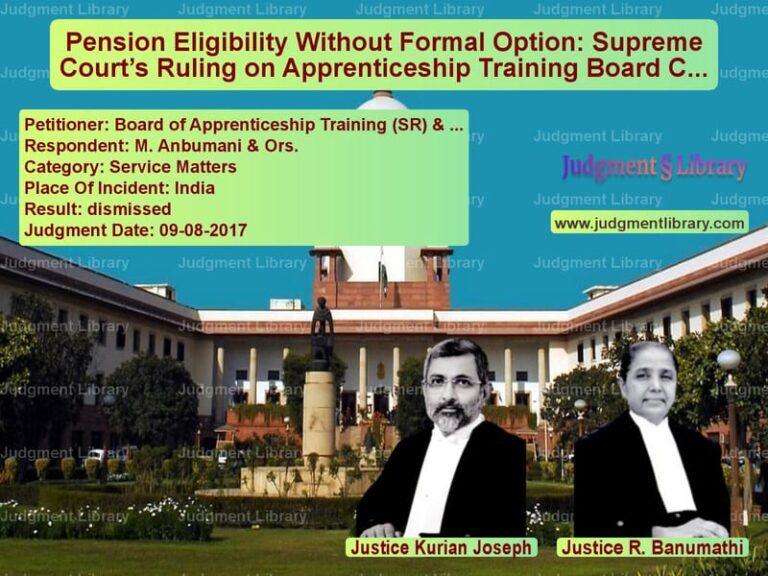Supreme Court Upholds Tax Audit Cap for Chartered Accountants: A Landmark Judgment on Professional Regulation
The Supreme Court of India recently delivered a crucial judgment in the case of Shaji Poulose vs. Institute of Chartered Accountants of India & Others, addressing the legal and constitutional validity of the cap on the number of tax audits a Chartered Accountant can undertake in a financial year. The Court ruled that this limitation, imposed by the Institute of Chartered Accountants of India (ICAI), was necessary to maintain audit quality, ensure equitable distribution of work, and prevent monopolization within the profession.
Background of the Case
The dispute arose when multiple Chartered Accountants challenged the Guidelines issued by the ICAI in 2008, which imposed a ceiling on the number of tax audits under Section 44AB of the Income Tax Act, 1961. Initially set at 30 audits per year, this limit was later increased to 45 and then 60 audits per Chartered Accountant.
Key Legal Issues
- Did the ICAI have the authority to impose a tax audit limit?
- Was the restriction a violation of Article 19(1)(g) (freedom to practice any profession) of the Constitution?
- Did the restriction discriminate against certain Chartered Accountants, violating Article 14 (right to equality)?
- Could exceeding the specified audit limit be deemed professional misconduct?
Petitioner’s Arguments
The Chartered Accountants challenging the ICAI Guidelines contended that:
- The restriction on tax audits was arbitrary and violated their fundamental right to practice their profession under Article 19(1)(g).
- The ceiling lacked a reasonable classification and disproportionately affected individual practitioners compared to large firms.
- The restriction led to financial hardship for professionals in smaller towns who relied on tax audits for their primary income.
- There was no clear evidence to show that conducting more than 60 tax audits led to poor quality reports.
- Guidelines issued by ICAI did not have legislative backing and could not be enforced as law.
Respondents’ Arguments (ICAI and the Government)
The ICAI and the Government defended the restriction, arguing that:
- The audit limit was necessary to maintain high-quality audits and prevent financial misreporting.
- The regulation ensured equitable distribution of work among Chartered Accountants.
- The ICAI had the authority to regulate professional conduct under the Chartered Accountants Act, 1949.
- Allowing unlimited tax audits could compromise the integrity of financial statements, affecting investors and stakeholders.
- The cap was based on expert recommendations, including a report from the Comptroller and Auditor General (CAG), highlighting the deterioration in tax audit quality due to excessive workloads.
Supreme Court’s Judgment
The Supreme Court upheld the ICAI’s authority to impose the restriction, ruling that:
“The right to practice any profession under Article 19(1)(g) is not absolute and can be subject to reasonable restrictions in the public interest. The ICAI’s Guidelines on tax audit limits are a legitimate exercise of its regulatory function.”
The Court made the following observations:
- Reasonableness of the Restriction: The audit limit was a reasonable restriction under Article 19(6) as it ensured audit quality and prevented unethical practices.
- Public Interest: The restriction was in public interest, as inaccurate audits could lead to tax evasion and financial mismanagement.
- Equitable Distribution of Work: The cap prevented monopolization by large firms, allowing smaller practitioners to get fair opportunities.
- Enforceability: The Court ruled that exceeding the audit limit constituted professional misconduct under ICAI’s disciplinary framework.
Impact of the Judgment
This ruling has far-reaching implications for Chartered Accountants and the corporate sector:
- Stricter Compliance: Chartered Accountants must strictly adhere to the audit cap to avoid disciplinary actions.
- Stronger Regulation: The ICAI is now empowered to enforce professional standards more effectively.
- Business Implications: Companies must ensure they engage Chartered Accountants who comply with audit limits to avoid regulatory complications.
- Potential for Further Review: The Court left the door open for ICAI to revisit and adjust the audit cap if deemed necessary in the future.
Conclusion
The Supreme Court’s judgment underscores the need for professional regulation in the interest of audit quality and public trust. While it restricts individual Chartered Accountants from taking on an unlimited number of tax audits, it reinforces the principle that professional conduct must align with ethical standards and public interest. This landmark decision ensures that financial audits in India maintain credibility and integrity, benefiting the economy at large.
Petitioner Name: Shaji Poulose.Respondent Name: Institute of Chartered Accountants of India & Others.Judgment By: Justice B.V. Nagarathna, Justice Augustine George Masih.Place Of Incident: India.Judgment Date: 17-05-2024.
Don’t miss out on the full details! Download the complete judgment in PDF format below and gain valuable insights instantly!
Download Judgment: shaji-poulose-vs-institute-of-charter-supreme-court-of-india-judgment-dated-17-05-2024.pdf
Directly Download Judgment: Directly download this Judgment
See all petitions in Disciplinary Proceedings
See all petitions in Judgment by B.V. Nagarathna
See all petitions in Judgment by Augustine George Masih
See all petitions in dismissed
See all petitions in supreme court of India judgments May 2024
See all petitions in 2024 judgments
See all posts in Service Matters Category
See all allowed petitions in Service Matters Category
See all Dismissed petitions in Service Matters Category
See all partially allowed petitions in Service Matters Category







